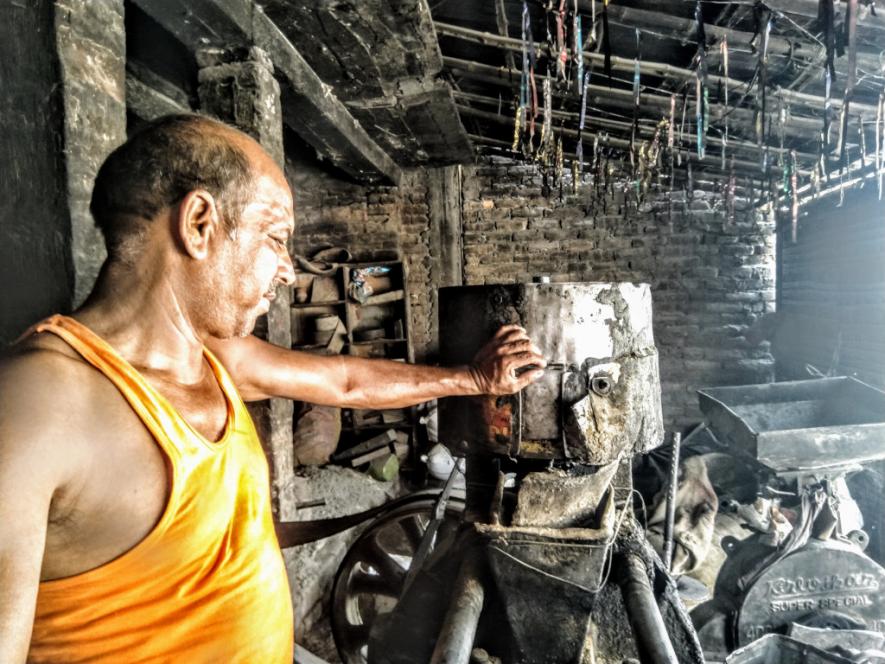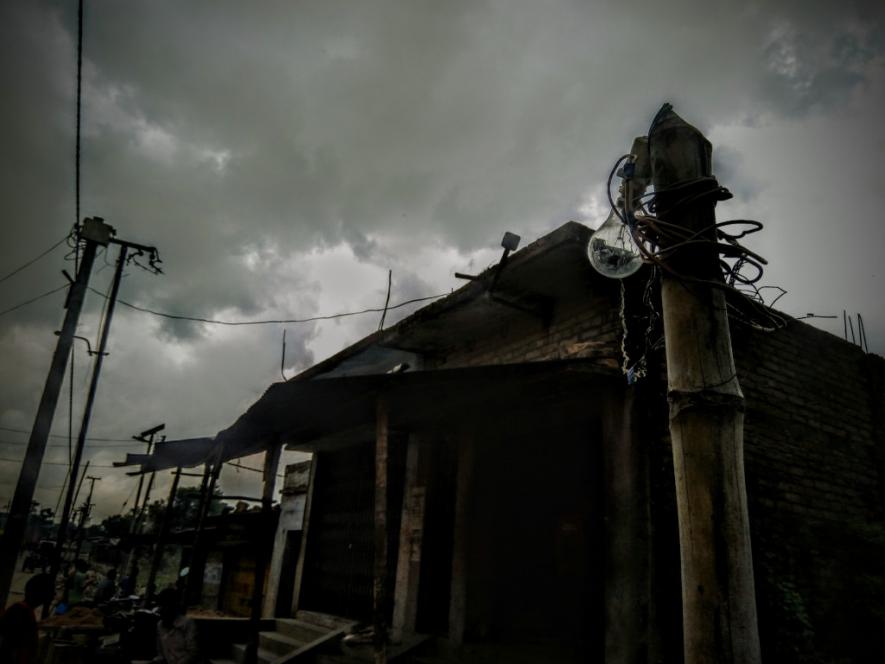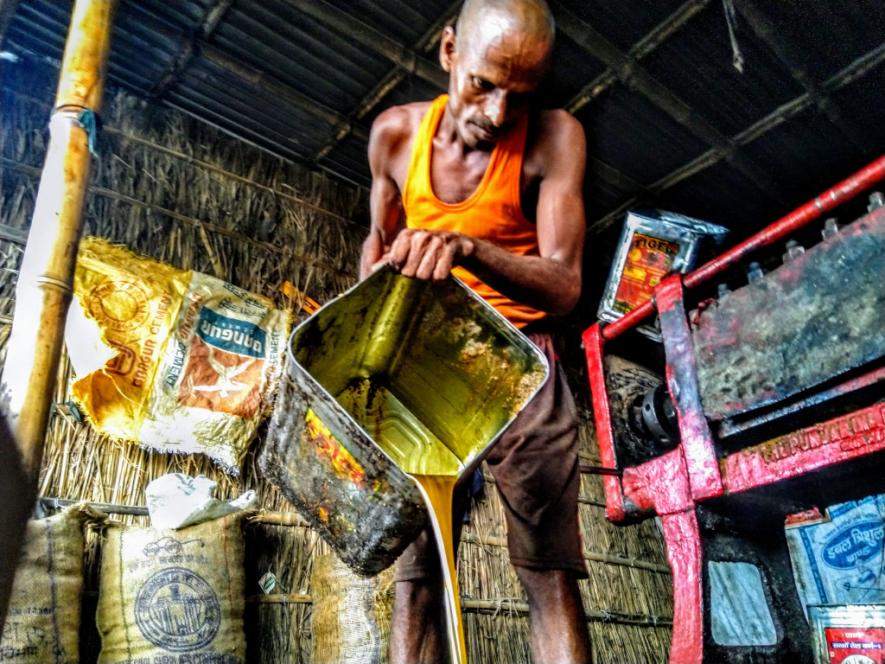Oil Pressing in Bihar: Once Profitable, Not Lucrative Anymore

Pramod Prasad, who had switched to oil pressing around two decades ago. | Photos by Ujjawal Krishnam
Pramod Prasad, 51, is sitting on the raised counter of his oil press. At Fatuha Road, a semi-rural locality alongside Areraj-Turkaulia Marg in Areraj tehsil of East Champaran District, there are three operational oil presses. Pramod’s is the oldest, he started his oil press some two decades ago when this area was not bustling with business activities.
Having extracted mustard oil in advance, Pramod now awaits customers. Under the thatched rain-proof roof supported by brick walls, his shop has a few sacs of oil cakes and oil seeds, and some cut-outs of oil tin cans placed near the expeller; an Eicher generator is placed against the back-wall with flat belt joining rotating shafts of the expeller and generator. One abandoned mini rice mill and tools are kept next to the oil press machine.
In this region of Bihar, Teli, a Vaishya caste of the lower stratum, existing on the boundary of untouchables, has been traditionally engaged in oil pressing. In fact, the work of oil extraction performed by the people of this caste was considered impure to an extent that upper castes were forbidden to see anybody belonging to this caste, when venturing out of their home.
The people of this caste, till the 20th century, used to have kolhu, i.e. traditional oil crusher or press nucleus, and the mechanical task had to be performed by oxen to drain oil.
Following the introduction of electro-mechanical oil expellers, other social castes were motivated to pursue this apparently easy-going business compared to their traditional caste occupation. This included horizontal as well as vertical social mobilisation of people towards the oil presses which had by then replaced kolhus. Vaishyas, along with other lower and untouchable castes, too, started flocking to this business. It was only possible, they said, because tel or oil is not defiled even though it comes in the contact of untouchables according to local caste customs.
The need to set-up an oil press at Fatuha Road was felt by Pramod, a Rauniyar Bania by caste, who earlier had a small rice mill near Areraj main road. “Pahle ke hisab se kharcha badh gael auri amdani u hisab uhe ba (The income in oil pressing hasn’t increased proportionately to balance inflation and expenditure),” he said in Bhojpuri. Pramod’s traditional occupation was to run grocery shop. However, the irregularity of income in that sector pushed him to switch to other businesses and eventually he ended up with the job of oil extraction.
“Ten years ago, the market rate of flaxseed was Rs. 1,100 per quintal…now it is Rs. 3,500,” he says, while accounting the gain disparity, “however, the price of oil product has not increased.” He adds, “At the time when flaxseed was being sold at Rs. 1,100 per quintal, its oil was priced at Rs. 60 per litre. It is Rs. 100 now.” He earns in the range of Rs. 700 and Rs. 800 per day from the oil press, out of which a fixed daily wage of Rs. 300 goes to the helper Raju Prasad, a resident of Badhai patti area. As Raju was absent on the day this reporter visited Pramod’s shop, he was managing the workshop alone.
Pramod says, “With this trifling income, it is becoming difficult to look after the essential needs, like education, of my six children.” He has four daughters and two sons. A Class 9 pass out, he believes that education is a weapon in this age. “Everyone has to change according to time. This business may look comfortable to outsiders, but only insiders know how difficult it has becom. There are several brands in the market, people prefer packaged items over this. This is not an economical oil manufacturing unit; we hardly save any money. How can we even think of introducing our children to it? It will be a burden, unlike the business empire that the children of udyogpati (industrialists) happily inherit,” he adds warily.
Pramod tells us that his business comes in the middle-class stratum. “The feature of middle-case business is that it generates income, but only up to a subsistence mark. The income has a cap and it remains static over a period,” he clarifies, adding that “Oil pressing rarely sees any growth in profit.” The term ‘middle-class business’ is a term he has coined himself.
Mantu Kumar is selling mustard oil in the verandah of his father’s shop. He will be appearing for the matriculation exam next year and is enrolled in Areraj High School. He is temporarily managing the shop as his father has taken part in Kanwar Yatra, the pilgrimage to the Shiva temple in Deoghar of Jharkhand state. Asked about the difficulties in the business of oil pressing, he says, “I do not have any accurate knowledge of the business-related problems pertaining the workshop as I rarely come here.” His elder brother Guddu Shah and father Bharat Shah run the oil press. Mantu has only been tasked to sell extracted oil, he doesn’t know how to operate expeller. He has sold mustard oil worth of Rs. 800 till then, however, he doesn’t know what profit it will carve. Mustard oil, he says, is sold at his shop at Rs. 90 per litre in ‘retail’; liquid measuring pitchers of various scales dipped in oil indicate it.

Power cut is a serious issue in the area; the pressers have no option except to resort to diesel engines.
However, Mantu knows of one issue which even an outsider traipsing around this area can observe. “People here are disturbed by the fluctuating electric supply,” he says. “If there is a power cut for four or five hours during daytime, how would anyone operating electrical machine make profit? With soaring prices of diesel, it certainly is not feasible to operate generators,” he adds, pointing at an incandescent bulb whose wires are wrapped around the neck of a bamboo pole and wires crossed over to their shop. The bulb functions as an indicator.
Just across the street is the third oil press. Rambabu Shah, in his early forties, is pushing seeds through the cavity of the machine. Within a few minutes, waste products come out from the other end. Waste product, in fact, is a by-product oil cake. He again makes it pass through a caged barrel; the process is repeated thrice, he says. Oil seeping through a slit-like opening is collected in the tin cans.

Rambabu.
As Rambabu is engaged in pressing oil, this reporter talks to Dhurpati Kunwar, the only customer at the shop. Dhurpati, in her late sixties, has come along with her grandson to get oil pressed out of 12 kilograms of mustard seeds grown on her field. “It is good that mustard is grown in the winter season, otherwise we would have been forced to buy this too,” she says, describing the loss of 1 bigha of rice seedlings due to flash floods this year. Her family couldn’t find enough paddy seeds in the market as many like her were also trying to replant paddy following the flash floods. Thus, seeds could be planted only on 6 katha of the field, leaving 14 katha cropless. However, she is relaxed now as she says that her mustard stock is adequate for cooking oil needs for this year.
Dhurpati’s oil is ready, the pressing is to be charged at the rate of Rs 6/litre. Approximately one litre of oil can be produced from 2.5 kilograms of mustard seeds, depending on the efficiency of the method and machine. She also takes away oil cake for which she is not charged, but it could be sold to the oil press if she wished to. The price of oil cake is Rs. 14 per kg and it is usually utilised in fishery by locals. It is also bought by the dairy farmers.
Rambabu presses oil only on-demand. He is a Madhesia Kanu Bania by caste; the traditional job of his caste, he says, is to sell bhujia (snacks) and pakaudi (fritters). However, he discarded it and opted to work as a labourer at construction sites. Then, he joined Pramod’s press and learnt the art of expeller pressing. “Rambabu is a Businessiya Teli,” says Dhurpati Kunwar. By “Businessiya Teli”, she refers to those non-Telis who operate oil presses.
The active season for oil presses coincides with the months of February and March, when mustard crops are harvested. In other months, oil presses face the odds. The prices of oil seeds shoot up by Rs. 1,000 per quintal, which raises barricades for landless oil extractors like Pramod and Rambabu to buy stock from wholesale market. While old extractors like Pramod somehow manage to invest, this doesn’t reciprocate for Rambabu, a newcomer with no financial backing.
“I do not have enough money or galla to buy extra raw seeds to expel oil and sell it in retail,” he says, who opened this oil press some five years ago. The cost of second-hand expeller was Rs. 40,000, which he purchased with his savings. “Dilli me itna dho-dho ke nu kama ke kholale bani, auri ehime saat admi ke kharcha chalela (I opened this shop from the earnings I made by carrying bricks in Delhi. A family of seven is dependent on this),” he says talking about his days of struggle when he used to earn Rs. 150 per day. Now, he earns between a maximum of Rs. 300 and a minimum of Rs. 50 per day depending on the orders arriving at his doors.
As this reporter says that, at least, his family wouldn’t be facing any scarcity of oil, he responds with a local proverb– “Ghar me kolhu, teli khae sukha”–which can be roughly translated to “The cobbler’s son always goes barefoot”.
Get the latest reports & analysis with people's perspective on Protests, movements & deep analytical videos, discussions of the current affairs in your Telegram app. Subscribe to NewsClick's Telegram channel & get Real-Time updates on stories, as they get published on our website.
























